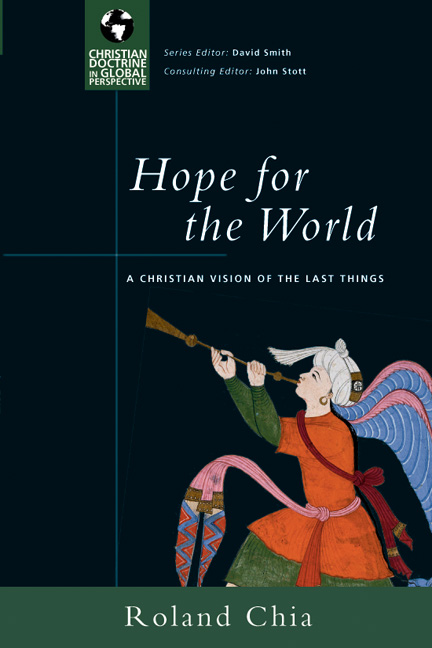Tony Richie on dispensationalism
From the Conversations with Readers department appearing in the Spring 2008 issue.
 In Tony Richie’s review of Roland Chia, Hope for the World: A Christian Vision of the Last Things (IVP, 2005), Pastor Richie says “While Chia briefly notes ‘historic premillennialism,’ he focuses almost exclusively on ‘dispensationalist premillennialism.’ The former builds on the apocalyptic literature of the Scriptures and the patristic teaching of the early Church, the latter on an ultra-literalist hermeneutic of Scripture shaped by a prefabricated paradigm popularized by J. N. Darby and C. I. Schofield [sic] around the turn of the twentieth century. Increasingly, informed classical Pentecostals are identifying irreconcilable differences with such fundamentalist versions of dispensationalism. Dispensationalists are chiefly strong advocates of cessationism, and often entrenched opponents of Pentecostalism.”
In Tony Richie’s review of Roland Chia, Hope for the World: A Christian Vision of the Last Things (IVP, 2005), Pastor Richie says “While Chia briefly notes ‘historic premillennialism,’ he focuses almost exclusively on ‘dispensationalist premillennialism.’ The former builds on the apocalyptic literature of the Scriptures and the patristic teaching of the early Church, the latter on an ultra-literalist hermeneutic of Scripture shaped by a prefabricated paradigm popularized by J. N. Darby and C. I. Schofield [sic] around the turn of the twentieth century. Increasingly, informed classical Pentecostals are identifying irreconcilable differences with such fundamentalist versions of dispensationalism. Dispensationalists are chiefly strong advocates of cessationism, and often entrenched opponents of Pentecostalism.”
The distinctions that Richie criticizes Chia for not making are not genuine distinctions. Dispensationalism is not one-size-fits-all; there are a lot of significant differences among dispensationalists. Here are some examples of different dispensational views: cessationists who use ultra-dispensational arguments to keep the charismata in the early church, many Pentecostals that believe there will be an outpouring of the Spirit before the Rapture (whereas non-Pentecostals say that the apostasy of our culture is that mark of the end coming soon), and many Pentecostals who hold the idea that if you are not right with God that you will not “go up” in the Rapture. I agree that Chia should not lump all pre-tribulation pre-millenarians together. However, Brother Richie appears to have created a straw man of what he feels is dispensationalism. To say that dispensationalism is built on an ultra-literalist hermeneutic is simply incorrect. These are like theological swear words. I fail to see how “belief in the chronology and reality of rapture-great tribulation-millennium” is something other than dispensationalism.
Richie has developed a good reputation for himself through his writings in this publication, and I do appreciate what he has done here, even if we disagree on what dispensationalism is.
—DJ
Response from Tony Richie:
I appreciate D. J.’s penetrating insight and gracious attitude. Biblical and theological conversations in this kind of mode are always a pleasure for me. They also tend to be more informative. Moreover, I think D. J. is correct in his general assertion that dispensationalism is a complex category. We ought to avoid oversimplification. However, in a short book review, the original author’s, in this case, Chia’s, discussion limits one’s range. Yet D. J.’s critique concerns itself with my own definition of (and disputation with?) dispensationalism. Particularly, he resists charges of “ultra-literalism” and challenges whether retaining commitment to the rapture-tribulation-second coming-millennium continuum avoids dispensationalism after all. Mostly, he wishes to call attention to the complexity of the dispensationalist classification. I hope I understand and represent him correctly. Assuming I am, I will proceed to clarify my own position.
In a sense all Christians are dispensationalists in that they distinguish between the Old/New Testaments (Covenants) of Moses and Jesus (John 1:17). Furthermore, Pentecostals are generally dispensationalists in their belief in a pneumatological eschatology, or “latter rain” outpouring of the Holy Spirit (cf. Joel 2:23). However, “classic dispensationalism,” goes much farther, compartmentalizing God’s dealings with humanity to a point of historical discontinuity. In other words, they tightly seal off the “dispensations” of history until the unchanging character and nature of God and his Word appear inconsistent or, worse, incongruous. Though there are other versions, for instance, the more recent (and more palatable) “progressive dispensationalism” of Marvin Pate and others, the classic form of Darby and Scofield, albeit updated and expanded by Chafer and Ryrie and others, is still by far the most prominent. In fact, later adaptations are more like departures because they acquiesce on traditionally key points. For example, they abandon or seriously alter, the traditional dispensationalist doctrine that God has two separate peoples and programs, Israel and the Church, with the Church being merely “a divine parenthesis”—as they term it—in redemptive history. As this duality was a defining tenet of classic dispensationalism, to what extent they are still truly dispensationalist remains debatable. The extreme literalism (I don’t mean to “swear”!) of classic dispensationalists is indisputable to anyone who has ever waded through tons of discussion about why kingdom of heaven and kingdom of God in the Synoptic Gospels must mean totally separate things or the difference between Israel and Jacob as denominatives for the OT theocracy. The same mindset lies behind the typical hard distinction between Israel and the Church. Although many liberal critics, such as Barbara Rossing, miss the point, belief in the Rapture is not necessarily dependent on dispensationalism. Excellent Pentecostal scholars such as Stanley Horton (The Promise of His Coming, 1967) and Hollis Gause (Revelation: God’s Stamp of Sovereignty on History, 1983) are not dispensationalist but do believe in the pre-tribulation Rapture of the Church. For me personally, belief in the pre-tribulation Rapture is a matter of imminence as much as anything. I believe the Bible teaches Christ could come at any moment and we had better be ready (e.g., Matt 24:44; Lu 12:40).
I am grateful to D. J. and to PR for an opportunity to engage each other on these important matters of our faith. I look forward to a continuing and deepening discussion.
—Tony
Category: In Depth, Spring 2008


